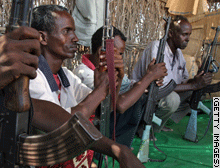Wednesday, May 10, 2006
 Somalian gunmen sit in the shade in the southern town of Wajid, west of Mogadishu, in this March photo.
Somalian gunmen sit in the shade in the southern town of Wajid, west of Mogadishu, in this March photo.MOGADISHU, Somalia (AP) -- Islamic militiamen and secular fighters battled for control of Somalia's capital Wednesday despite promises of a cease-fire. Six people were killed Wednesday, bringing the death toll to at least 96, with nearly 200 others wounded, according to officials.
Heavy weapons fire echoed through the city as the fighting spread to another Mogadishu neighborhood. The battle between the Islamic Court Union and the Alliance for the Restoration of Peace and Counter Terrorism has centered on the northern neighborhood of Sii-Sii, with neither side gaining an advantage. Most of the victims in the most recent fighting were civilians caught in the crossfire.
"Despite the Islamic courts' unilateral cease-fire, there are no traces of an end to the hostilities," said Abdi Kariin, a foreign exchange dealer.
The U.N. Secretary General's Special Representative for Somalia, Francois Lonseny Fall, issued a statement Wednesday appealing for "leaders on both sides to step back from the brink and reconsider the damage they are inflicting on the population."
"Whatever the allegiances, the intermittent conflict between heavily armed camps has resulted in indiscriminate loss of life and has created fear and chaos for those civilians trapped in the crossfire," said Fall. "The indiscriminate use of heavy machine guns, mortars, rocket-propelled grenades and artillery in and between urban areas is unacceptable."
Islamic Court Union chairman Sheik Sharif Sheik Ahmed said Tuesday that his group would observe a cease-fire beginning late Tuesday, but it never took hold. Abdulahi Shir'wa, a civil leader, said neutral groups were attempting to meet with the two militias on Wednesday to negotiate another cease-fire, but so far without success.
Nuur Daqle, one of the alliance's commanders, said he was ready to observe a cease-fire and had been told that the Islamic court militias were also ready to stop fighting, but that so far, he'd seen no let up in the battle.
"We are ready to cease fire, but the so-called Islamic courts are unreliable, they are offering, but keep on shooting at us," said Daqle.
A spokesman for the courts could not be immediately reached from comment. Prime Minister Ali Mohamed Gedi also called on all sides to stop fighting from his government's headquarters in Baidoa, 150 miles west of Mogadishu. Though his government has U.N. backing, it has so far failed to assert itself outside of Baidoa.
Somalia has had no effective central government since 1991, when warlords ousted longtime dictator Mohamed Siad Barre and then turned on each other, carving this nation of an estimated 8 million people into a patchwork of anarchic, clan-based fiefdoms.
Islamic fundamentalists have portrayed themselves as an alternative, capable of bringing order and peace, but they have not hesitated to use force and have allegedly linked up with al-Qaida terrorists.
The secular Alliance for the Restoration of Peace and Counter terrorism militia and the Islamic Court Union militia have been squaring off for several weeks to stake out strategic positions in preparation for a larger battle for control of Mogadishu.
Rumors abound that the United States is backing the secular forces. Somalia's President Abdullahi Yusuf Ahmed told The Associated Press in an interview last week that he believes the American government is supporting the secular alliance, which includes ministers in an interim Cabinet, as a way of fighting several top al-Qaida operatives that are being protected by radical clerics. Ahmed offered no evidence, and the U.S. has said only that it had met with a wide variety of Somali leaders in an effort to fight international terrorists in the country.
Noncombatants said they distrust both sides in the fighting.
"This is the third time they have fought in a civilian area since April this year," said Abdullahi Fiidow, a former military colonel.
Ahmed Moalin, a former school teacher whose house was destroyed by a mortar round, said both sides have been resupplying and fortifying their positions as the fighting continued.
"The fighting has had a very negative impact on poor people like me. My six children and my wife have slept outdoors for a third night," Moalin said.

















No comments:
Post a Comment